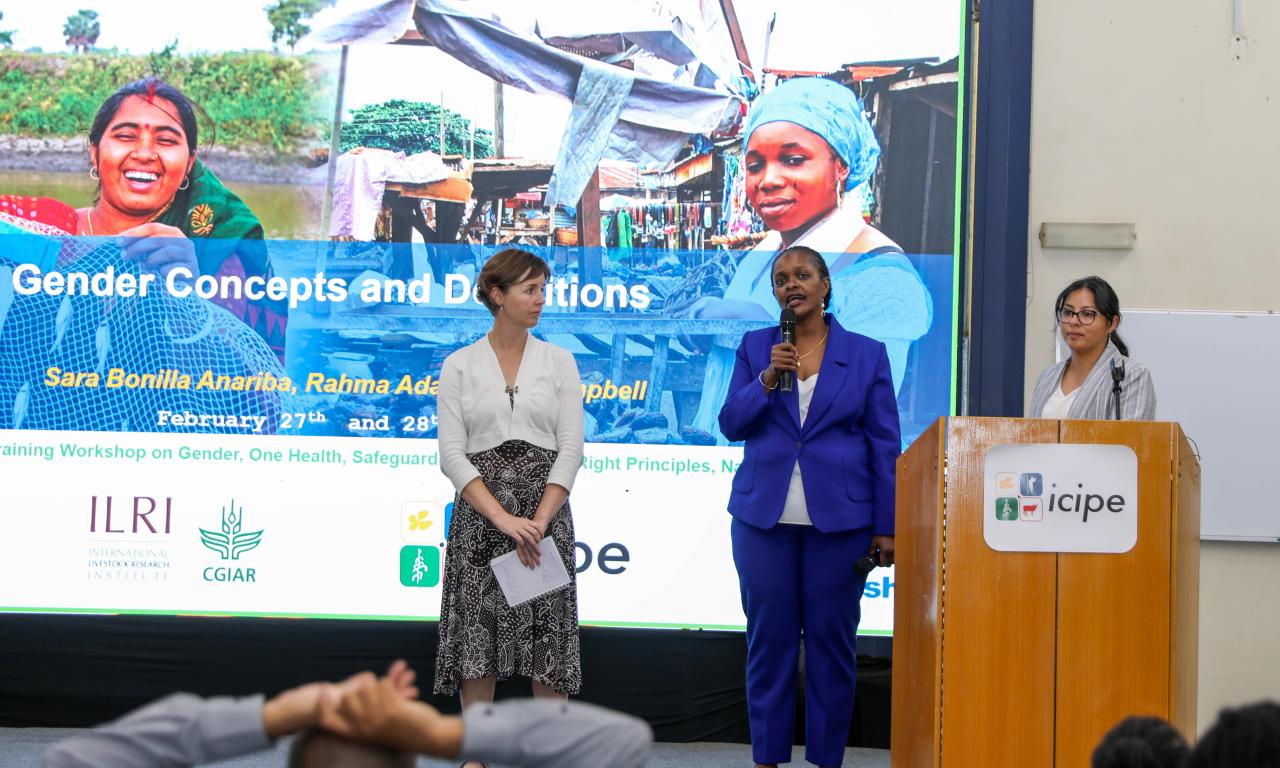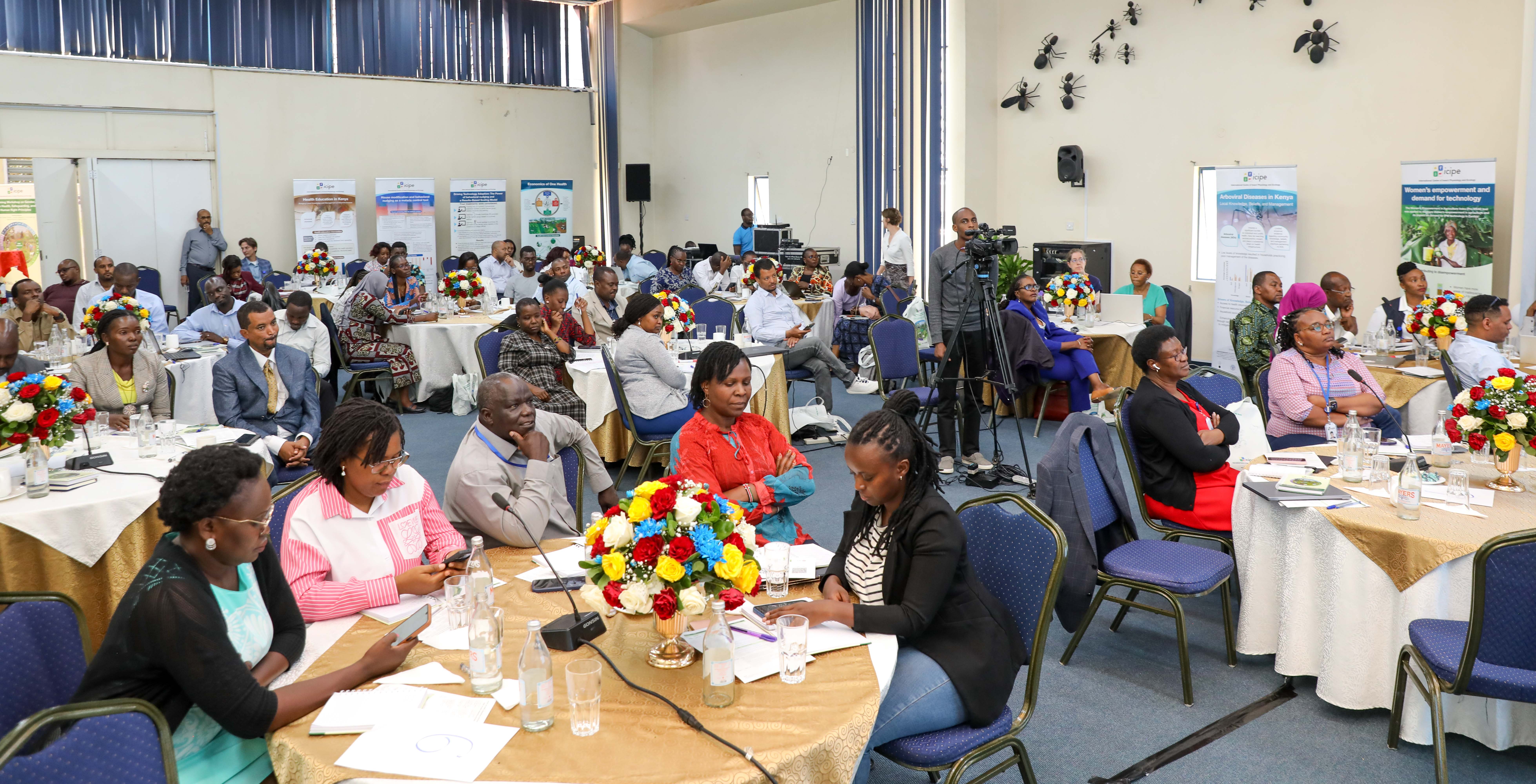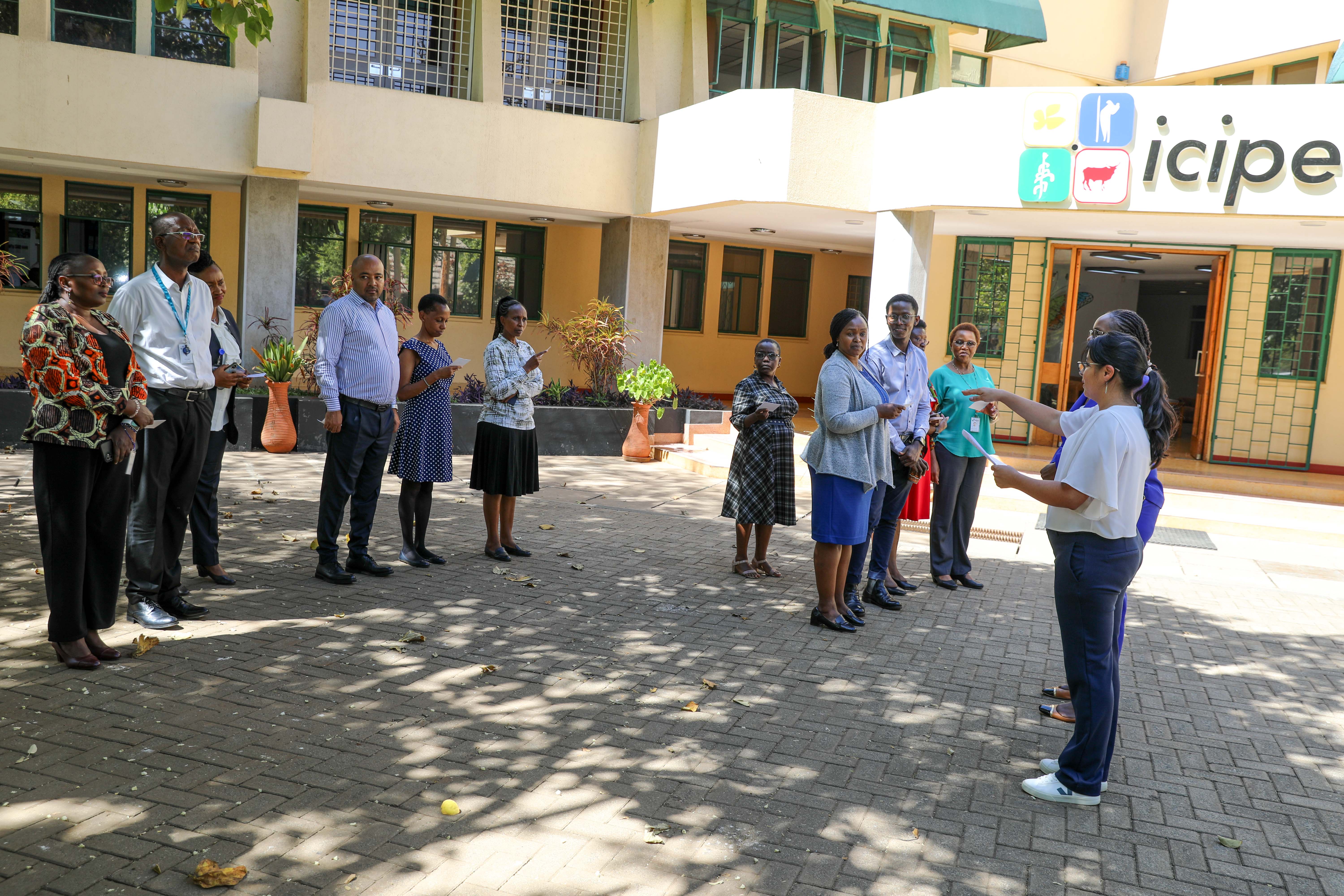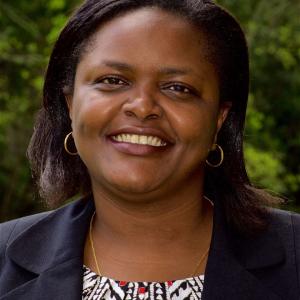
Gender training, held by WorldFish and ILRI, during the Gender, One Health, Safeguarding, and Human Rights Principles Workshop at the International Centre of Insect Physiology and Ecology (ICIPE), in Nairobi, earlier this year, oriented and skilled 200+ participants with key gender concepts and practical tools to integrate equity and inclusion in their programs.
The workshop, facilitated by Dr. Rahma Adam, Dr. Sara Bonilla, and Dr. Zoë Campbell, drew participants from Ethiopia, Kenya, Rwanda, Tanzania, and Uganda.
Through interactive, reflective, and practice-oriented learning activities, participants explored how gender and intersecting forms of exclusion influence health, livelihoods, and environmental outcomes in the East African region.
As One Health approaches gain momentum in East Africa, integrating gender equality and social inclusion is more important than ever. One Health emphasizes the interconnection between human, animal, and environmental health. However, without a clear gender lens, One Health programming can reinforce structural inequalities, particularly for women, youth, and other marginalized groups who are disproportionately affected by zoonotic diseases, climate shocks, and limited access to healthcare or land.
This workshop aimed to bridge the gap between technical programming and social equity by providing participants with both conceptual foundations and practical understanding.
“Many attendees acknowledged that gender is often treated as an add-on rather than an integral part of program design, monitoring, and evaluation,” said Dr. Zoë Campbell.
Through group discussions, scenario-based exercises, and participatory methods, the training highlighted the importance of rethinking power dynamics, resource access, and voice in One Health and agrifood systems.

Transformative Approaches to Promote Gender Equality and Social Inclusion
A major theme of the workshop was the distinction between gender-responsive and gender-transformative approaches.
“While gender-responsive strategies aim to meet practical needs—such as providing training or inputs to women—transformative approaches go deeper by questioning and shifting harmful gender norms, roles, and power relations,” said Dr. Rahma Adam.
During a “Gender Roles Spectrum” exercise, participants sorted common agrifood system tasks, such as seed saving, disease surveillance, or livestock vaccination, according to perceived gender roles. This sparked honest discussions about how cultural expectations influence the division of labor, who controls resources, and whose labor is recognized (or not). In many cases, what was deemed “women’s work” carried significant responsibilities but limited visibility, voice, or reward.
Another interactive activity was the “Power Walk,” where participants stepped into the roles of fictional characters of different agrifood systems, such as an uneducated youth farmer, a widowed woman with no land rights, or an older man with political connections. As scenarios related to shocks (e.g., climate change, disease outbreaks, or policy changes) were read aloud, individuals stepped forward or backward depending on how their role would be impacted.
“By the end of this exercise, participants could visualize how social identities such as gender, age, class and education interact to shape access to opportunities,” said Dr. Sara Bonilla Anariba. The exercise made power and privilege visible and prompted collective reflection on what inclusion truly means.
Intersectionality was also a core concept throughout the training. Rather than treating gender in isolation, the sessions encouraged participants to consider how gender intersects with other dimensions—such as ethnicity, disability, location, and age—to produce unique forms of marginalization. Scenario-based discussions challenged attendees to design inclusive projects and programs that actively engage those typically left behind.

Building Institutional Capacity
The workshop also created space for participants to identify institutional and policy gaps in their own areas of work. A common concern was the persistent lack of sex-disaggregated data and the limited integration of gender indicators in research, extension, and policy development. Participants called for stronger accountability mechanisms, sustained investments in capacity-building, and meaningful participation of women and marginalized groups in decision-making.
Impact and Way Forward
Dr. Beatrice Muriithi, ICIPE Scientist – Gender and Impact Assessment indicated that the workshop was a success as it enabled them to train staff and partners.
“Evaluation results showed strong outcomes, with over 87% of participants reporting improved understanding and most scoring above 85% in post-training assessments,” said Dr. Muriithi.
Participants have since been using the knowledge gained at the workshop in their work.
“The workshop strengthened my awareness of gender and human rights dimensions within the One Health framework. I learned practical strategies for promoting equity and inclusivity in multidisciplinary research,” said Dr. Ayub M. O. Oduor, Senior Lecturer, Technical University of Kenya. “In my recent research grant applications, I applied this knowledge by ensuring that project design, field engagement and data collection processes and protocols are gender-responsive and aligned to safeguarding standards,” said Dr. Oduor indicating how he is applying the knowledge gained.
He further indicated that he would ensure the teams he works with are sensitized on gender dynamics and ethical conduct during field work.
Sharing her feedback on the workshop, Caroline Nungari, Associate Human Resources Manager at ICIPE, said: “The workshop helped me apply a deeper gender lens to my human resources work, particularly in recruiting and retaining female scientists. A key insight from the training was the urgent need to better support young female scientists, many of whom struggle to balance demands of research, further studies, and family life. This often leads to career stagnation while their male counterparts progress. As a HR unit, we have the responsibility to develop strategies and programs that enable these scientists to achieve a sustainable work-life balance, thereby narrowing the gender gap.”
Participants left the workshop with a deeper understanding of the social dimensions of health, agriculture, and environment—and with examples of how to integrate gender considerations into their work. Many expressed an interest in further training, institutional follow-up, and support in developing gender-transformative strategies that move beyond “tick-box” compliance.

